Brian Clegg's Blog, page 33
May 13, 2020
The BBC and anniversaryitis
 Like most media outlets, the BBC is obsessed with anniversaries, but they've really stretched credulity with their latest - The Great British Menu features a banquet celebrating '150 years of children's literature' - which is clearly baloney (something I've never seen consumed on GBM).
Like most media outlets, the BBC is obsessed with anniversaries, but they've really stretched credulity with their latest - The Great British Menu features a banquet celebrating '150 years of children's literature' - which is clearly baloney (something I've never seen consumed on GBM).I ought to say first of all that I'm a fan of the programme, not only because my illustrious Christmas University Challenge teammate, Matthew Fort is one of the judges. I'm not knocking the programme itself - I suspect this bizarrely arbitrary number was imposed by hierarchy (I can just imagine an episode of W1A when the planners meet and come up with this pseudo-anniversary).
Why is it baloney? Well, clearly children's literature is older than this. The Fairy Tales of the Brothers Grimm, which despite being distinctly dark were certainly intended for children (the original title was Children's and Household Tales) date back to 1812, over 200 years.
Ah, the BBC says, but we're talking books first published in English. Okay, well Alice's Adventures in Wonderland (amusingly featured in the publicity shot on the BBC's media website) was published in 1865, and that's 155 years ago - and it certainly wasn't the first.
Okay, the BBC comes back, but Oliver Twist was the first book with a child protagonist. Two problems with this. One is it's not children's literature - it was definitely written for an adult audience. And secondly it was published in book form in 1838. So it's the 182nd anniversary of that.
Fair enough, say the BBC, but Charles Dickens died in 1870, and that was 150 years ago. Well, yes. So really rather than celebrating 150 years of children's literature we are celebrating 150 years since the death of someone who didn't write children's literature.
Tongue removed from cheek, children's literature is a great topic for them to use as a theme - but I really wish they hadn't made up this totally spurious anniversary.
Published on May 13, 2020 02:18
March 30, 2020
Cryptic challenge from the Conundrum Book site

Short of a cryptic challenge? I've launched a new bonus puzzle on the Conundrum book site - first 3 correct solutions submitted there (not here, please!) win a free copy of my ebook of mystery games, Organizing a Murder - Please share!
Published on March 30, 2020 03:56
March 25, 2020
Review: The Nanny State Made Me - Stuart Maconie
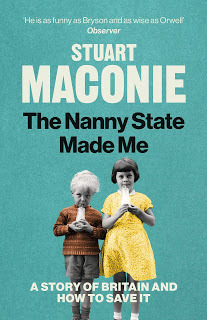 I am a great fan of Stuart Maconie's UK travel/music industry books (I confess that, coming from Rochdale to his Wigan, he paints a picture I love). In many ways he has surpassed Bill Bryson, which is saying something. But the one thing I've never been comfortable with is his political alignment. If I position myself as closest to New Labour, he has always felt to the left of this. Of itself it's not a big issue, but I've particularly struggled with his romanticisation of the working class life.
I am a great fan of Stuart Maconie's UK travel/music industry books (I confess that, coming from Rochdale to his Wigan, he paints a picture I love). In many ways he has surpassed Bill Bryson, which is saying something. But the one thing I've never been comfortable with is his political alignment. If I position myself as closest to New Labour, he has always felt to the left of this. Of itself it's not a big issue, but I've particularly struggled with his romanticisation of the working class life.My dad's parents were mill workers in Rochdale most of their lives (my grandad had to play professional cricket to make something to live on when they were laid off in the early 30s). And one thing they always stressed to me - the first in my family to go to university - was that they hadn't wanted the same life for my dad and me. They saw nothing romantic and noble in mill work - it was a means to live and no more.
It's not to say that I don't share Maconie's dislike of those who turn their noses up at Northerners or working class traditions and lifestyles. But it made me a bit wary of taking on this book (sorry it's taken me so long to mention the book). However, I shouldn't have been. It's a well-deserved counter to those who would pull apart the support net of the state. Maconie takes us through the NHS (of course), state schools, buses and trains, the dole, public utilities, public parks, the BBC and more. He's affectionate but never blinkered - happy to point out the failings of state-run organisations, but equally able to make it clear how the alternatives have proved worse.
I was surprised how often I was already aligned with his thinking, despite being to the right of him politically. It helps that he's prepared to actually think things through rather than react in a knee-jerk fashion. So, for example, rather than take the usual 'the BBC is inherently tied to the licence fee and to get rid of it would destroy it' approach many take, he admits to coming round to a subscription model because - paradoxically - it would free up the BBC to stop trying to be everything to everyone (and so putting out a lot of mediocre programming) and to concentrate on what it does best.
Where I hadn't seen eye-to-eye previously, Maconie mostly persuaded me to his viewpoint - which I found remarkable. For example, like him I am grammar school educated, but am totally in favour of comprehensives. But I'd always thought having private schools was an acceptable hat tip to choice, where Maconie makes very strong arguments as to why they should be at minimum relieved of their charitable status and preferably got rid of.
Another example of him winning me over is on re-nationalising the railways. Two things have always made me suspicious of this. I can remember how awful British Rail could be (where I quite like our local GWR franchise). And I worked for a nationalised company (BA) that went private and it was so much better after privatisation. But BA has real competitors on its routes to restrain its business practice, where the privatised railways don't. I can now see it just doesn't make sense to have private railways companies (or utilities for that matter).
A remarkable book, then. My only regret is that there isn't a bit more of the travel writing - Maconie manages to incorporate a bit, but not as much as I'd like. Since the political message is pretty much the same throughout, it can feel a little repetitive after a while. But this doesn't make it any less an excellent piece of writing - and especially telling at the time of reading when the virus crisis means that the state is having to play a very big part in all our lives. As I write, the Labour Party is about to elect a new leader. But they haven't got the right person standing. With Maconie in charge, they would be unbeatable.
The Nanny State Made Me is available from Amazon.co.uk and Amazon.com
Published on March 25, 2020 03:43
March 24, 2020
Free Capel books on Kindle
At the moment, many of us have more time to fill than usual. I'd like to do my bit by offering my first three Capel murder mystery novels free to download on Kindle. I'm only allowed to do it for five days: they will be available to download from Tuesday 24 to Saturday 28 March 2020 inclusive. I've provided links below to download from Amazon.co.uk or Amazon.com. Enjoy - and feel free to mention this to anyone who might be interested.
Not got a Kindle? You can download a free Kindle reader for tablets, smartphones and computers.
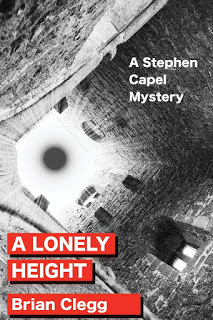 A Lonely HeightWhen Stephen Capel moved to his first parish in a rural village after four years as a prison chaplain he expected a quiet life. Not to discover a drowned man in the ruined tower on top of Glastonbury Tor. Dealing with an increasingly complicated relationship with the local police, Capel begins to suspect that there is a link between this death and the murder of a famously eccentric photographer in Glastonbury Abbey the year before. His quest takes him to the sophisticated streets of Bath and up onto the ancient white horse at Uffington. In the end, though, it's Capel's understanding of people that will make or break the case.
A Lonely HeightWhen Stephen Capel moved to his first parish in a rural village after four years as a prison chaplain he expected a quiet life. Not to discover a drowned man in the ruined tower on top of Glastonbury Tor. Dealing with an increasingly complicated relationship with the local police, Capel begins to suspect that there is a link between this death and the murder of a famously eccentric photographer in Glastonbury Abbey the year before. His quest takes him to the sophisticated streets of Bath and up onto the ancient white horse at Uffington. In the end, though, it's Capel's understanding of people that will make or break the case.
The Stephen Capel Mysteries bring the classic British detective story into the twenty-first century.Download free from Amazon.co.uk
Download free from Amazon.com A Timely Confession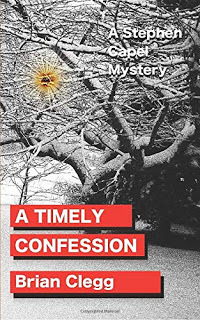 In the sequel to A Lonely Height, we find Stephen Capel settled into his first parish in the village of Thornton Down.
In the sequel to A Lonely Height, we find Stephen Capel settled into his first parish in the village of Thornton Down.
As Christmas approaches, an unlikely confession of murder throws Capel into a complex and dangerous investigation. A software developer has been killed just before the launch of a make or break new product. While trying to help those left behind, Capel is pulled into the mystery of who really killed Mark Nelson. As Capel attempts to cope with an upheaval in his private life and to help those whose lives are torn apart by a second murder, he must search the snow-covered streets of Bath for answers before another victim dies.
Download free from Amazon.co.uk
Download free from Amazon.com
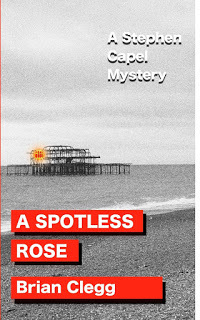 A Spotless RoseIn the third in the series, vicar Stephen Capel is on his first holiday after joining his first parish in the village of Thornton Down. In Brighton with his girlfriend, Vicky Denning, Capel hopes to get away from it all. Taking a stroll on the beach, he sees a woman fall from the ruined pier. He rescues her, but discovers that she is dead - stabbed - and soon finds himself suspected of her murder. Each day, as Capel tries to untangle himself from suspicion, another woman dies. The race is on to prevent yet another death.
A Spotless RoseIn the third in the series, vicar Stephen Capel is on his first holiday after joining his first parish in the village of Thornton Down. In Brighton with his girlfriend, Vicky Denning, Capel hopes to get away from it all. Taking a stroll on the beach, he sees a woman fall from the ruined pier. He rescues her, but discovers that she is dead - stabbed - and soon finds himself suspected of her murder. Each day, as Capel tries to untangle himself from suspicion, another woman dies. The race is on to prevent yet another death.
Download free from Amazon.co.uk
Download free from Amazon.com
Not got a Kindle? You can download a free Kindle reader for tablets, smartphones and computers.
 A Lonely HeightWhen Stephen Capel moved to his first parish in a rural village after four years as a prison chaplain he expected a quiet life. Not to discover a drowned man in the ruined tower on top of Glastonbury Tor. Dealing with an increasingly complicated relationship with the local police, Capel begins to suspect that there is a link between this death and the murder of a famously eccentric photographer in Glastonbury Abbey the year before. His quest takes him to the sophisticated streets of Bath and up onto the ancient white horse at Uffington. In the end, though, it's Capel's understanding of people that will make or break the case.
A Lonely HeightWhen Stephen Capel moved to his first parish in a rural village after four years as a prison chaplain he expected a quiet life. Not to discover a drowned man in the ruined tower on top of Glastonbury Tor. Dealing with an increasingly complicated relationship with the local police, Capel begins to suspect that there is a link between this death and the murder of a famously eccentric photographer in Glastonbury Abbey the year before. His quest takes him to the sophisticated streets of Bath and up onto the ancient white horse at Uffington. In the end, though, it's Capel's understanding of people that will make or break the case.The Stephen Capel Mysteries bring the classic British detective story into the twenty-first century.Download free from Amazon.co.uk
Download free from Amazon.com A Timely Confession
 In the sequel to A Lonely Height, we find Stephen Capel settled into his first parish in the village of Thornton Down.
In the sequel to A Lonely Height, we find Stephen Capel settled into his first parish in the village of Thornton Down.As Christmas approaches, an unlikely confession of murder throws Capel into a complex and dangerous investigation. A software developer has been killed just before the launch of a make or break new product. While trying to help those left behind, Capel is pulled into the mystery of who really killed Mark Nelson. As Capel attempts to cope with an upheaval in his private life and to help those whose lives are torn apart by a second murder, he must search the snow-covered streets of Bath for answers before another victim dies.
Download free from Amazon.co.uk
Download free from Amazon.com
 A Spotless RoseIn the third in the series, vicar Stephen Capel is on his first holiday after joining his first parish in the village of Thornton Down. In Brighton with his girlfriend, Vicky Denning, Capel hopes to get away from it all. Taking a stroll on the beach, he sees a woman fall from the ruined pier. He rescues her, but discovers that she is dead - stabbed - and soon finds himself suspected of her murder. Each day, as Capel tries to untangle himself from suspicion, another woman dies. The race is on to prevent yet another death.
A Spotless RoseIn the third in the series, vicar Stephen Capel is on his first holiday after joining his first parish in the village of Thornton Down. In Brighton with his girlfriend, Vicky Denning, Capel hopes to get away from it all. Taking a stroll on the beach, he sees a woman fall from the ruined pier. He rescues her, but discovers that she is dead - stabbed - and soon finds himself suspected of her murder. Each day, as Capel tries to untangle himself from suspicion, another woman dies. The race is on to prevent yet another death. Download free from Amazon.co.uk
Download free from Amazon.com
Published on March 24, 2020 02:14
March 22, 2020
Review: Arriving Late at Wolf Hall
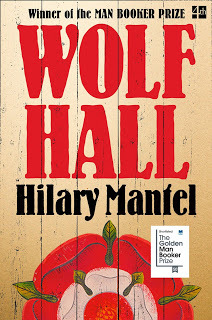 I know practically everyone else in the world has already read Wolf Hall - but I've come late to the party. Oddly enough, the delay was primarily because it won the Booker Prize. That tends to label a book as literary fiction, and for me that all too often means pretentiousness and a book that is both miserable and a pain to read. However, I saw a review of Hilary Mantel's third book in the series which praised Wolf Hall for its humour. That pushed me over the edge - and I'm glad it did.
I know practically everyone else in the world has already read Wolf Hall - but I've come late to the party. Oddly enough, the delay was primarily because it won the Booker Prize. That tends to label a book as literary fiction, and for me that all too often means pretentiousness and a book that is both miserable and a pain to read. However, I saw a review of Hilary Mantel's third book in the series which praised Wolf Hall for its humour. That pushed me over the edge - and I'm glad it did.Admittedly I do enjoy pretty much anything Tudorbethan - it's my favourite musical period, the architecture's great and the whole Thomas Cromwell / Henry VIII / Church of England story is deeply fascinating. I had already read all of C. J. Sansom's Shardlake series set in the same time and place (for example, Lamentation ) and had loved those - and I had quite enjoyed the TV adaptation despite a few moans, though that wasn't as well endowed with humour as the book's marvellous dialogue. But Mantel won me over after a few pages. It is a remarkable book that deserves all the accolades it has, both in terms of the handling of story and bringing the period alive.
I'm no historian, so I don't know how accurate it is - but I get the impression it's not bad in this regard. I read somewhere that Mantel did away with the saintly image of Thomas More, though I think, to be fair, Josephine Tey had already done that to the limit in her fascinating if sometimes rather dull The Daughter of Time . More to the point, though, Wolf Hall is a wonderful novel.
I do have one issue I need to briefly moan about, which is perhaps the only way in which the author seems to have consciously attempted to be literary in her approach. She insists on referring to Cromwell as 'he', even when convention has it that 'he' should refer to the male person most recently mentioned. A classic example was 'Norfolk will preside. He will tell him how it will be.' That first 'he' is not Norfolk, but Cromwell. I lost count of the number of times I had to go back and re-read a paragraph to work out who 'he' was.
Moan over. Loved it. Having a break with a couple of other books (it was quite long), but then I'm diving into volume two.
If, like me, you are one of those rare people who hasn't read it, Wolf Hall is available from Amazon.co.uk and Amazon.com
Published on March 22, 2020 07:55
March 6, 2020
The guilty shop
 Like many others, I use Amazon, but feel a bit guilty about it.
Like many others, I use Amazon, but feel a bit guilty about it.I know I'm not alone in this, as I regularly get asked why my www.popularscience.co.uk popular science/science fiction book review site has links to buy books from Amazon.
The reason is simple - I get paid a small affiliate fee if someone uses one of the links at no cost to the purchaser, and it's the bookselling site with such an affiliate system that has the widest reach.
However, as some people really didn't seem to like me using Amazon, I thought I'd add a second option and now am providing a link to UK bookseller Foyles as well. And here's the thing. Quite a lot of people have clicked through to Foyles... but no one has bought a book from them.
The fact is that no one else offers the same combination of low prices and rapid delivery as does Amazon. So, while it gives you a nice warm glow to order from an independent bookshop (and I certainly try to buy from them whenever I'm in bricks-and-mortar shopping mode), it's hard to resist the practical benefits of visiting the Amazon site.
Quick example - up to now I've managed to resist reading Wolf Hall and its sequels, for reasons that will require another blog post. But I was so impressed with a review of the third book in the trilogy, that I thought I ought to give the books a try. I decided this at 10pm on Wednesday evening. By lunchtime on Thursday, Amazon had delivered my copy.
I'll probably continue to feel guilty... but it's not going to stop me using them.
I also get affiliate fees if you click through to Amazon simply by using these links to Amazon.co.uk and Amazon.com .
Published on March 06, 2020 08:41
January 11, 2020
Review - The Starless Sea - Erin Morgenstern
 Erin Morgenstern's first novel, The Night Circus is one of my favourite books, so I was awaiting the infamously difficult second novel with a mix of anticipation and concern. Now I've finished reading it, I think both emotions were appropriate.
Erin Morgenstern's first novel, The Night Circus is one of my favourite books, so I was awaiting the infamously difficult second novel with a mix of anticipation and concern. Now I've finished reading it, I think both emotions were appropriate.Although still a fantasy with a partial real-world setting, The Starless Sea is a different kind of book to The Night Circus. As both have something of a period feel (despite The Starless Sea being set in the present day), I would say that the new book is like an Impressionist painting to the first novel's Pre-Raphaelite. In The Night Circus, the attraction of the book was crystal clear - here it's fuzzy and consists more of light than detail.
Overall, The Starless Sea is a very clever creation, intertwined in a complex fashion. Most of the narrative has interlaced fairy stories, which initially seem to be little elements on the side but gradually weave their way into the whole. It's a long book - perhaps a tad too long - but there's plenty going on... it's just not always obvious why, or where it's going. The protagonist, Zachary Ezra Rawlins, is a grad student who mostly studies computer games and quite often the experiences he goes through feel like taking part in a massive fantasy-based adventure puzzle game - for classic games lovers, The Seventh Guest or Myst on steroids.
A useful comparison is one of the greatest American fantasy writers, Gene Wolfe. In quite a few of Wolfe's books the reader has to suspend frustration as the author piles in confusing elements that only come together in the end to make a magnificent whole. This happens here as well, and often is done well - but some of the confusing elements come too near the end and never truly resolve.
I don't want to sound negative here. I very much enjoyed reading this book, and it was a daring move on the part of Morgenstern. But it didn't come together as brilliantly as I hoped or as cleverly as it promised.
Available from Amazon.co.uk and Amazon.com
Published on January 11, 2020 05:53
January 3, 2020
Review - The House of Silk - Anthony Horowitz
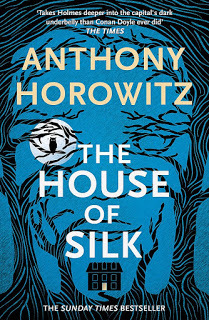 I was more than a little sceptical of the idea of someone other than Conan Doyle writing a Sherlock Holmes novel, especially one that would prove to be more than a pastiche, but Anthony Horowitz has managed to tread a remarkably fine line and produce an engaging Holmes novel that is very much true to the spirit of Conan Doyle, but has its own distinct nature.
I was more than a little sceptical of the idea of someone other than Conan Doyle writing a Sherlock Holmes novel, especially one that would prove to be more than a pastiche, but Anthony Horowitz has managed to tread a remarkably fine line and produce an engaging Holmes novel that is very much true to the spirit of Conan Doyle, but has its own distinct nature.While Horowitz makes use of all the dark settings of Victorian London, and language that we expect from the narrator, Dr Watson, he extends the characters of Holmes and Watson to add in significantly more humanity - these are less two-dimensional characters than those that Conan Doyle portrayed. (Don't get me wrong: I love the originals, but these versions have a little more to them.) Even the Baker Street Irregulars become people here, rather than devices to move the plot along.
Another advantage Horowitz has is being able to bring in a crime that it is unlikely Conan Doyle could ever have written about - which he does with striking effect.
The book wasn't perfect. We could have had a few more twists and turns - perhaps too many pages were given over to introspection - and I would have liked a bit more contribution from Holmes and particularly Mycroft, who seems bereft of his usual Olympian powers. But it remains a very enjoyable sidebar to the Holmes stories and I look forward to reading the second entry in the series.
Available from Amazon.co.uk and Amazon.com
Published on January 03, 2020 08:03
December 31, 2019
Review - Sleep No More - P. D. James
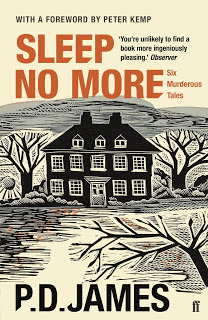 I like a good murder around Christmas, preferably with a Christmas theme. When I got these six murderous short stories by P. D. James, I was only expecting some good writing, but in practice a couple of them do have Christmas themes, notably the longest entry in the relatively slim volume, The Murder of Santa Claus, which also includes a traditional country house setting. It makes a fitting companion to the four stories in
The Mistletoe Murder
(though I do feel Faber were rather tight in splitting these into two - both books together would make a good length for a single volume).
I like a good murder around Christmas, preferably with a Christmas theme. When I got these six murderous short stories by P. D. James, I was only expecting some good writing, but in practice a couple of them do have Christmas themes, notably the longest entry in the relatively slim volume, The Murder of Santa Claus, which also includes a traditional country house setting. It makes a fitting companion to the four stories in
The Mistletoe Murder
(though I do feel Faber were rather tight in splitting these into two - both books together would make a good length for a single volume).These mostly aren't murder mysteries in the traditional sense, in that they tend to be seen from the viewpoint of protagonists rather than detectives, but each story features a killing (probably - one is not entirely honest with us), and each is both a beautiful piece of writing and takes us into the working of a dark mind. My favourite was the most gut-wrenchingly powerful, The Girl Who Loved Graveyards, which starts as a story of a poor orphaned girl, but turns out to be something very different... but each is in its own way a little gem.
Many other writers have tried their hand at short story murder mysteries with mixed success, but I don't think anyone else did it as well as P. D. James. These are miniature masterpieces, and though they don't really fulfil my urge to find the perfect Christmas murder mystery, they are certainly excellent pieces of work that reminded me that I ought to read more P. D. James than I have to date.
Available from Amazon.co.uk and Amazon.com.
Published on December 31, 2019 07:23
December 30, 2019
Review - A Christmas Railway Mystery
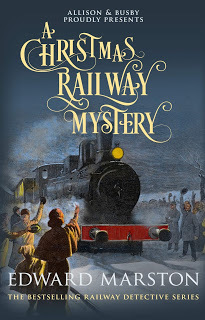 Each year I attempt to find at least one Christmas murder mystery - after all, what would Christmas be without a good murder?
Each year I attempt to find at least one Christmas murder mystery - after all, what would Christmas be without a good murder?I thought I had hit the jackpot with A Christmas Railway Mystery - not only a Victorian Christmas setting, but the location of the murder was the Great Western Railway village in my home town of Swindon. And there is no doubt that the book had its enjoyable elements, but it also had some severe limitations.
Perhaps the best bit was the evocation of the Railway Village, built by the GWR adjacent to the railway works where it built its rolling stock, reflecting the mix of benevolence and patronising control that seemed to accompany some of the better Victorian employers. Edward Marston evokes the detail of the village and its life well, apart from the oddity of describing the (still existing) buildings as red brick - they aren’t.
Marston also gives a satisfying mix of strands, with the main murder investigation in Swindon set alongside developments in the detective Inspector Colbeck’s home life and a parallel investigation into the disappearance of Colbeck’s grumpy boss, Superintendent Tallis in Canterbury, poorly investigated by Colbeck’s scheming rival, Inspector Grosvenor. And it all trundles along quite well. But the characters are rather wooden, the dialogue isn’t great and there is little heed paid to ‘show, don’t tell.’ This extends to some magnificent overkill description. For example, when we first come across the railway village church, a relatively minor setting, we are told: ‘constructed of limestone, it was roofed in tile and lead and surmounted by a crocketted spire... The church had a capacious interior, comprising a five-bay nave with a clerestory, a north aisle and a south aisle with a three-bay chapel and a three-bay chancel.’ Pevsner would have been proud - but it hardly moves the action forward in a murder mystery.
Colbeck is apparently an excellent detective, though he seems to work entirely on collecting circumstantial evidence, then pretty much randomly accusing possible suspects from those who the evidence fits.
It’s a pleasant enough read, but don’t expect either the period ingenuity of a Sherlock Holmes tale or the depth of a modern murder mystery. With that proviso it’s an acceptable addition to the Christmas murder collection, but I don’t think I will be revisiting the railway detective series.
Available from Amazon.co.uk and Amazon.com
Published on December 30, 2019 06:53



